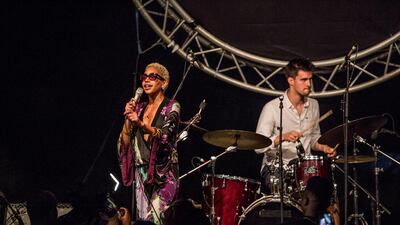The relationship between mental health and jazz has always been intertwined.
The genre’s great practitioners, from singers Ella Fitzgerald and Billie Holiday to composer and saxophonist Charlie Parker, often used the art form to transform deep pits of anguish into music that inspires and heals.
Read More
US singer Brenna Whitaker is latest artist to take residency at Q's Bar and Lounge
Franz Ferdinand’s Alex Kapranos on Philippe Zdar and chances of a UAE tour
Jazzablanca 2019: Paolo Fresu on his mission to expand the sound of the trumpet
This begs the question, are good jazz artists shaped by nurture or nature?
"I think it is a mixture of both," says US singer and rising star Judi Jackson. "If you look at an artist like Billie Holiday and you read her autobiography, you will discover the pain she went through. She is an amazing singer, but the fact that she was once destitute and hated on made her channel all that pain into her songs. I love jazz and I studied it. But I also try sing the songs that are a reflection of my life, where I came from and where I am heading too."
Jackson knows what she is talking about. Based between the UK and New York, the 26-year-old is an audacious jazz talent that has been selling out halls across Europe with her sensual and piercing renditions of songs by the great jazz divas.
From Nina Simone's Sinnerman to Billie Holiday's My Man Don't Love Me, there is no mistaking the emotional authenticity in that velvety voice. That is because she lived to tell the tale. Jackson may have come from Virginia, but she has been on the move ever since she was a teenager.
Born to a poet and academic mother who suffered in an abusive relationship, Jackson’s childhood years were spent in and out of women’s shelters. She was eventually taken in by a friend's family, after her mother's mental health deteriorated to a point requiring hospitalisation.
A creative spirit since childhood – Jackson has fond memories of singing at one of the many Salvation Army centres where she was temporarily housed in to raise the collective spirits – she realised by the age of 14 that she wanted to be a singer.
It was a message she delivered directly, a year later, to trumpeter Wynton Marsalis, when his tour bus stopped in Virginia a decade ago. Not long later, a care package arrived home from the jazz firebrand. It was a box of CDs of female singers - such as Billie Holiday, Ella Fitzgerald and Nina Simone - whose voices changed a generation. The message was clear: this is the level to aspire to reach your goal.
Jackson recalls that was all the motivation she needed. Graduating from college, she traveled to New York to meet Marsalis again at the Lincoln Jazz Centre, where he remains the artistic director.
This time around, she was a skilled singer with a burgeoning career and Marsalis took her under his wing.
Speaking to The National before her headlining appearance at Morocco's Jazzablanca Festival, Jacksons is adamant she is following a destined path.
“Everything that has transpired in my life has been done absolutely perfectly,” she says. “But when I mean perfectly, there are things in my past that were not absolutely perfect or right, but now I know that I am living in the moment, I have a better understanding.”
Jackson says those moments of insights often arrive to her on stage. After moving to London in 2017, she immediately made a name for herself by selling out both solo gigs and tribute shows to Nina Simone and Amy Winehouse.
She explains the hunger to hear these often tragic songs is not down to some morbid fascination. Jazz music, she says, always took hold in major metropolises because they serve as a tonic against the emotional drain of city living.
“London and New York are different in their own ways but in some aspects, they are the same,” she says.
“London, for example, still has the attitude that we own everything and everyone. That’s why they are so successful and the British pound is so high. All they do here is work. But with that being said, each big big city needs musicians and artists because they work as healers.”
With her shows described as ‘communal therapy sessions’ by fans, Jackson decided to document that experience for her debut album.
Released last year, Live in London was recorded at the Theatre Royal Stratford East and comprises of originals and covers showcasing the depth and, indeed, the rejuvenating qualities of her concerts.
Considering the emotional reactions from fans, did Jackson manage find to some lasting peace through her own work?
After a long silence, she states that healing happens best when it is shared.
“You brought up the word ‘peace’,” she says. “While the pain never goes away, you learn to use that emotion. You remember that emotion so you can use it in the work to inspire someone else, so they can heal from their pain. Then they can tell their friends who is suffering and they can pass it on. That’s how it works.”


